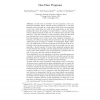Free Online Productivity Tools
i2Speak
i2Symbol
i2OCR
iTex2Img
iWeb2Print
iWeb2Shot
i2Type
iPdf2Split
iPdf2Merge
i2Bopomofo
i2Arabic
i2Style
i2Image
i2PDF
iLatex2Rtf
Sci2ools
121
click to vote
CRYPTO
2008
Springer
2008
Springer
One-Time Programs
Abstract. In this work, we introduce one-time programs, a new computational paradigm geared towards security applications. A one-time program can be executed on a single input, whose value can be specified at run time. Other than the result of the computation on this input, nothing else about the program is leaked. Hence, a one-time program is like a black box function that may be evaluated once and then "self destructs." This also extends to k-time programs, which are like black box functions that can be evaluated k times and then self destruct. One-time programs serve many of the same purposes of program obfuscation, the obvious one being software protection, but also including applications such as temporary transfer of cryptographic ability. Moreover, the applications of one-time programs go well beyond those of obfuscation, since one-time programs can only be executed once (or more generally, a limited number of times) while obfuscated programs have no such bounds. For ex...
Related Content
| Added | 19 Oct 2010 |
| Updated | 19 Oct 2010 |
| Type | Conference |
| Year | 2008 |
| Where | CRYPTO |
| Authors | Shafi Goldwasser, Yael Tauman Kalai, Guy N. Rothblum |
Comments (0)

